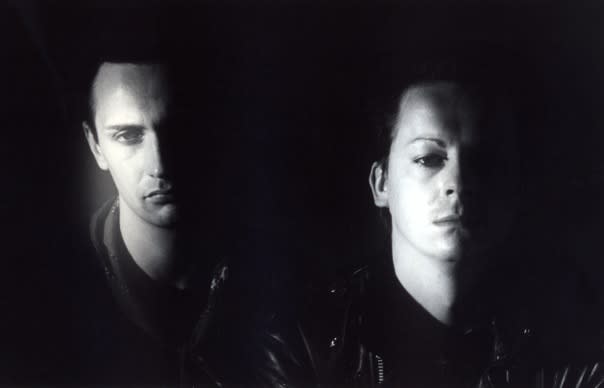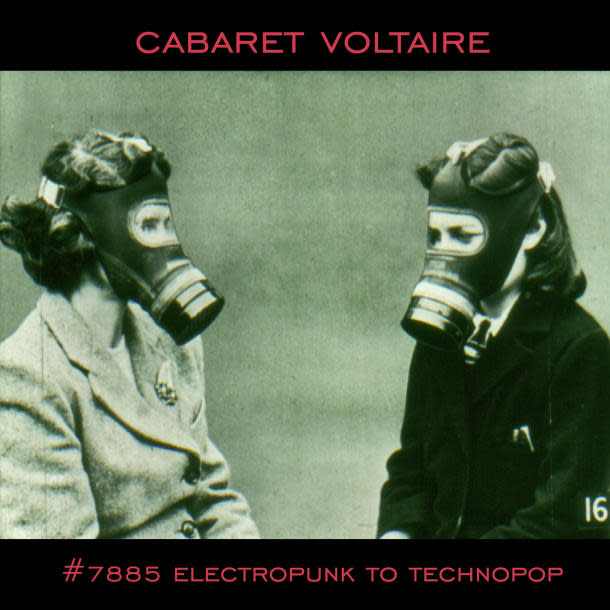Star Apps: Cabaret Voltaire
When electropunk trio Cabaret Voltaire performed its first show in Sheffield in 1975, Richard H. Kirk, Stephen Mallinder, and Chris Watson were assaulted by the mostly antagonistic crowd. The band fared better between 1978 and 1985, when they signed a deal with Virgin and developed a more commercial, club-friendly "pop" sound. Now down to single member, Richard H. Kirk, Cabaret Voltaire pays tribute to its golden, major-label era with the new 18-track compilation "#7885 (Electropunk to Technopop 1978-1985)," featuring boundary-pushing electronic gems "Nag Nag Nag," "Do the Mussolini (Headkick)," "Sensoria," "Landslide, I Want You," and "Just Fascination." I chatted with Kirk about the new compilation, his preferred recording software, whether he'll tour the US anytime soon, and why he isn't a fan of social media.

Cabaret Voltaire members Stephen Mallinder and Richard H. Kirk during the band's early '80s heyday.
(Credit: Mute Records)
Cabaret Voltaire hails from Sheffield, England, as do your contemporaries ABC, Human League, and Heaven 17. What was Sheffield's music scene like in the '70s?
When we started in the mid-'70s, Sheffield was a grim place to be. There were no real bands playing original or experimental music at that time. All you had was heavy rock bands [Iron Maiden and Def Leppard] or bands who played cover versions of chart music. There were a few clubs where they played James Brown and funk and disco. But there wasn't a scene of experimental music until Cabaret Voltaire came along and did our first live show in 1975, which ended up in mayhem, because some people in the audience took offense to the kind of stuff we were doing, which no one had really done. So I think the scene coalesced around Cabaret Voltaire, and then later came Human League.
What was so special about the 1978 to 1985 period for Cabaret Voltaire?
We were getting more into New York electro and dance music, and that was influencing what we did quite a lot. We thought it was a good direction to go in, because we had always been really into dance music, but never tried to do it in the earlier work so much. But then technology changed, and I started using live sequencers and programmable drum machines, and it just lent itself to a more stripped-back kind of sound that would work in clubs. We never got played by the radio, so we thought that maybe it's better to make music that's club friendly, because at least we'll get it across to people in some way.
"Sensoria" is certainly your most popular track to this day. What's the story behind it?
I think it's the one that people seem to focus on the most. Maybe because it had a really cool video, which won awards, and was the first music video requested by the Museum of Modern Art in New York. Surprisingly it didn't go on the charts in England. It did well in clubs but never crossed over in a big, commercial way. But it still sounds good to this day, so there must be something special about it.
The story behind it is we did the "Micro-Phonies" album, and "Sensoria" was part of that. It was actually two tracks, "Do Right" and "Sensoria." We worked with a guy named Robin Scott, who was well known as M for "Pop Music." We got him involved as producer, and it was his idea to put a hip-hop thing where people were starting to cut two different tracks together to make a new track, and that was his idea to do that. We brought another guy in named John Potoker, who was a cool engineer who had worked with Miles Davis and also Brian Eno and David Byrne. We spent a week in the studio with him, working on that track, and it was very difficult to organize, 'cause there was so much going on -- the fact that it was two tracks edited together. Bear in mind that we didn't have the sampling and computer technology that makes doing stuff like that so easy nowadays. So it was a long process. We were working nights in the studio starting at five and working till five in the morning, so it was quite an intense session. But by the end of it, we knew we had something pretty cool. A lot of that came down to John Potoker.
Was there ever a concern about going too mainstream?
Yeah, even though the music was commercial, we were still dealing with the same kind of ideas about control and people being manipulated by the media and governments. It was still pretty subversive music for those days. Even though we called it dance music, a lot of people would say that in anyone's definitions of dance music, it was still a little bit strange in a lot of respects.
Cabaret Voltaire's first trip to New York was in 1985, as part of a US tour. What was that experience like?
It was very exciting to me. I did go to clubs like Danceteria and Area, but the main thing that I remember was meeting with William Burroughs and John Giorno, because I had been a fan of Burroughs since the mid-'70s. I was a 17-year-old kid when I got "Naked Lunch," and I had met Burroughs twice before. Someone arranged for us to go to the Bunker. I think we did a photograph session, 'cause we had given John Giorno a track for one of his compilations.
How do you record or remaster music today?
I have two distinct ways of working. One is using a lot of MIDI equipment, which involves analog synthesizers and using MIDI to program and sequence things. I'm still using a very old computer called an Atari 1040ST, which I've been using since the late '80s. I just hook that up to some samplers and some MIDI analog keyboards and just run everything from that and then record it on to a Mac G4 that I've been using for a long time. Sometimes I just record stuff in Pro Tools, digitally, using multitrack plug-ins and stuff like that. So I have two ways of working, and both are out of date. But they work for me, so I'm sticking to them.
You also have a solo career. So why is it important to you to keep Cabaret Voltaire alive with continued releases?
I think it's music that different generations will discover, and I feel the same way [as] a writer [who] wants to keep their books in print. I'm not a big fan of downloading music, so I always try to make sure that things can be reissued on CD or vinyl, 'cause that's how I still prefer to listen to music, rather than an MP3.

#7885 (Electropunk to Technopop 1978-1985) is available on iTunes.
(Credit: Mute Records)
Do you still keep in touch with the former members?
I'm in touch with Chris quite a lot, and Stephen not so much. Basically those guys left -- Chris in 1981 and Stephen in 1993 and moved to Australia for 15 years or so. So I just wanted to carry on being the curator of Cabaret Voltaire. At the same time, I am working on some new material and am going to be performing live later this year. But it will just be myself and some machines.
Will you be touring the US?
If someone asks me. I haven't been to the States since 1991. It's weird, but I haven't had that many invitations. I'd love to go. I always enjoyed spending time in America. So it would be great.
What are your top mobile apps?
I can't answer that, because I only have a really old mobile phone, and it doesn't have any apps on it. I don't have an iPad, either. I'm not a Twitter-type person. I can't see the point in it, which may sound strange from someone who has a background in technology, but I just let other people get along with all that. There is an official Cabaret Voltaire Facebook page, but I don't get involved with that.

